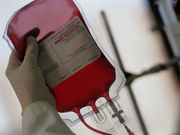National blood surveillance system will help agency ensure safety of the blood supply
TUESDAY, Dec. 22, 2015 (HealthDay News) — Men who have sex with men who have abstained from sex for one year will now be allowed to donate blood in the United States. The new policy, announced Monday by the U.S. Food and Drug Administration, reverses a three-decades-old ban on donations from this group of men that traces back to the start of the AIDS epidemic.
“We’ve taken great care to ensure that the revised policy continues to protect our blood supply,” Peter Marks, M.D., Ph.D., deputy director of the FDA’s Center for Biologics Evaluation and Research, said during a news conference. He added that the new recommendation includes “a 12-month deferral period for the most recent sexual contact for men who have sex with men, rather than the existing indefinite deferral.”
The change will also better align the FDA’s donation policy for men who have sex with men with its policies regarding other people potentially exposed to HIV, officials said. For example, there’s currently a maximum one-year deferral policy in the United States for blood donations by men who have had sex with an HIV-positive woman or commercial sex workers. The same goes for women who have had sex with HIV-positive men. However, sexually active gay men in a monogamous relationship would not be allowed to donate blood under the new policy.
The FDA said it will also implement a national blood surveillance system that will help the agency monitor the effect of the policy change and ensure the safety of the blood supply, health officials said.
Copyright © 2015 HealthDay. All rights reserved.








